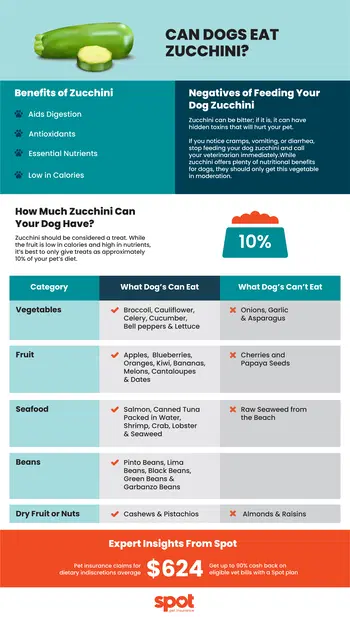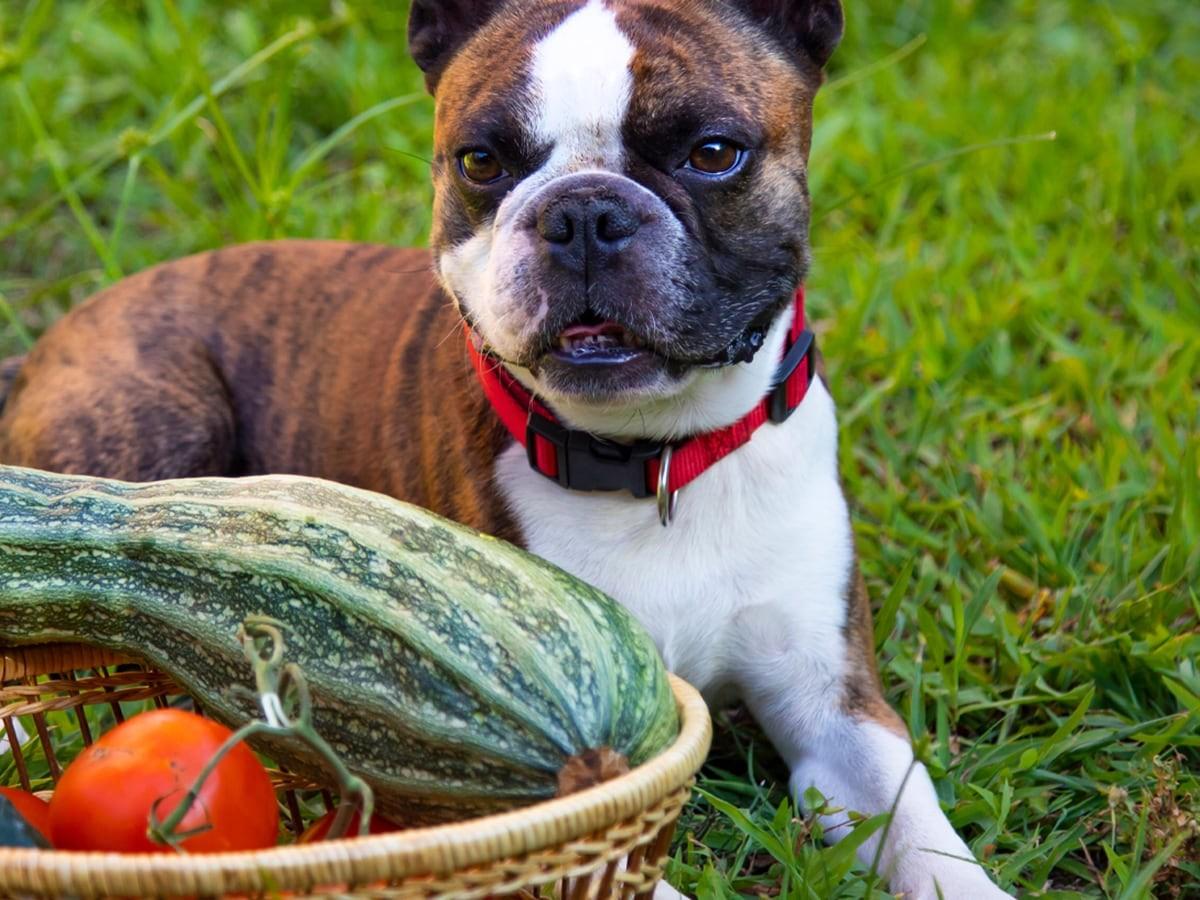Zucchini is a variety of summer squash. You may have heard it called a courgette. Typically, we consider zucchini to be a vegetable. The truth is that it’s technically a fruit.
If you want to be technical, zucchini is a berry. Would you ever think of this long, green food as a berry? If zucchini is one of the staples in your kitchen, you may wonder if your dog can have zucchini. After all, even if we don’t feed our dogs from the table, we could drop something in the kitchen, and Fido grabs it before we can.
Can Dogs Have Zucchini?
Zucchini is a safe choice for dogs, but you shouldn’t give your dog too much zucchini. Zucchini is full of nutrients. It has fiber as well as vitamins and minerals. However, supplementing won’t be necessary if your dog has a well-balanced diet, so any additional foods should be considered treats.
Benefits of Zucchini
Zucchini is filled with antioxidants, and the skin has the most antioxidants of any part of the fruit. Zucchini is helpful for digestion; it helps to lessen constipation. Zucchini is full of essential nutrients while being low in calories. One cup of zucchini only has 17 calories; this, combined with the significant amount of water and fiber, can help with weight loss.
Possible Negatives of Feeding Your Dog Zucchini
Zucchini can be bitter; if it is, it can have hidden toxins that will hurt your pet. Typically, those toxins are found in the leaves and stems of the plants, but sometimes they can be tasted in the fruit. While it isn’t necessarily toxic to humans, it can cause problems for your fur baby, so you must taste the zucchini before you give it to your dog.
Any time you add a new food to your pet’s diet, you must monitor closely for adverse reactions. If you notice cramps, vomiting, or diarrhea, stop feeding your dog zucchini and call your veterinarian immediately. While zucchini offers plenty of nutritional benefits for dogs, they should only get this vegetable in moderation. The same goes for any veggie—giving a dog too much can lead to digestive issues such as gas, diarrhea, and vomiting.1
Expert Insights From Spot
While sharing our favorite foods with our pets can be tempting, it's important to remember that not all human foods are safe for dogs. Spot's internal data shows that pet insurance claims for dietary indiscretions average $642*, highlighting the importance of caution and research before sharing snacks with your pet.
How Much Zucchini Can Your Dog Have?
Ensure that you are providing a healthy, well-balanced diet for your pet. Zucchini should be considered a treat. While the fruit is low in calories and high in nutrients, it’s best to only give treats as approximately 10% of your pet’s diet.
Always monitor your pet closely when you are providing new foods. It’s especially essential to limit the intake of zucchini if it’s a new food. Most dogs handle zucchini well, but there have been occasions where dogs have had adverse reactions to the food.

Can Dogs Have Other Vegetables?
There are many vegetables that your dog can eat, and some that you should avoid. You’ve probably heard not to give your dog onions, but do you know why?2 They are aromatics, and so is garlic, and those can cause iron depletion and kidney damage in your dog. Asparagus is also on the to be avoided list, but that’s because if you cook it, the nutrients are depleted.
Broccoli and cauliflower are cruciferous vegetables that your dog can eat, but keep in mind that they can cause flatulence. Celery, cucumber, and bell peppers contain antioxidants that are good for your dogs. Lettuce is hydrating but should be given in small pieces to avoid choking. Pickles are okay but should be used sparingly because the pickling compound can be harmful. 3
Can Dogs Eat Fruit?
Fruits are a beneficial addition to your dog’s diet. Take care with those that have high natural sugar content like bananas, melons, cantaloupes, and dates. Oranges have vitamin C and antioxidants, but if your dog doesn’t like citrus kiwi also has vitamin C.
Apples also have vitamin C as well as fiber, and vitamin A. Blueberries are rich in antioxidants, and pumpkin is good for their skin and digestion. Avoid cherries and papaya seeds as they contain harmful cyanide.
Can Dogs Have Seafood?
Salmon, canned tuna packed in water, shrimp, crab, lobster, and seaweed are all approved for your dog. However, don’t let them eat raw seaweed from the beach. Instead give them seaweed snacks without added toxins. Pay attention to how they react to shrimp, crab, and lobster as dogs can have shellfish allergies.
Can Dogs Eat Beans?
Can dogs eat beans? Beans are another group of foods that can provide health benefits to your dog. Other than gas-inducing properties, choosing beans for your pup provides them with nutrients such as folate, magnesium, and potassium. Pinto beans, lima beans, and black beans should only be given in moderation. Green beans are low calorie but quite filling, and chickpeas, also known as garbanzo beans, are full of protein and fiber.
Can Dogs Have Dry Fruit or Nuts?
If you like to snack on dry fruit or nuts, you may want to share with your puppy. Like most other foods, there are some in this category that should be avoided. Almonds and raisins cause stomach and kidney issues respectively. Cashews are usually safe, although some dogs can have an allergic reaction to them. Pistachios are a good choice if you want to give your dog nuts because they contain brain healthy B6.
The Takeaway
Zucchini is safe to feed your dog. However, it should be introduced slowly and remain a limited amount of your fur baby’s diet. Consult your veterinarian if you have questions about introducing zucchini or any other food to your dog’s diet.

With 10 years of experience as a pet parent, I aim to empower pet owners with insights into pet insurance and maintaining their pet's well-being. I aspire to be a trusted source, combining knowledge with a commitment to the welfare of our beloved pets.
*Jan 2019 to Aug 2024 administrator claims data.
"Can dogs eat zucchini?" PetMD, n.d. https://www.petmd.com/dog/nutrition/can-dogs-eat-zucchini
Burke, A. "Can dogs eat onions? everything you need to know," American Kennel Club, 07 May 2024, https://www.akc.org/expert-advice/health/can-dogs-eat-onions/
Clur, K.-B. "What vegetables can dogs eat? 14 vet-verified healthy options," Dogster, 25 Jun. 2024, https://www.dogster.com/dog-nutrition/what-vegetables-can-dogs-eat
The information presented in this article is for educational and informational purposes only and does not constitute or substitute for the advice of your veterinarian.












